The Best Over the Counter Dry Eye Remedies
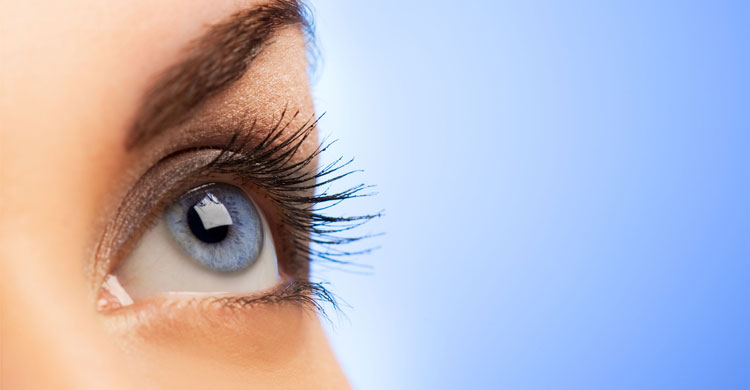
What is dry eye syndrome?
Dry eye syndrome is a consequence of a chronic lack of moisture on the eye surface. Symptoms of dry eyes range from minor but persistent eye irritation to significant inflammation and even scarring of the anterior surface of the eye.
As an alternative definition for symptoms known as dry eye syndrome, dry eye disease, or simply “dry eye,” the following medical terms are used:
- filamentary keratitis. It is commonly used to describe dryness and inflammation of the cornea.
- keratoconjunctivitis sicca. It is used to describe dry eye syndrome, which affects both the cornea and conjunctiva.
- dysfunctional lacrimal syndrome. It is used to draw special attention to the fact that insufficient quality of tears is just as important as their insufficient quantity.
Symptoms of dry eyes and dry eye syndrome:
- burning sensation;
- itchy eyes;
- painful sensations;
- heaviness in the eyes;
- eye fatigue;
- pain in the eyes;
- feeling of dryness;
- redness of the eyes;
- photophobia;
- blurry vision.
How we chose the best OTC medicine for dry eye?
The best medicine for dry eye syndrome will be dependent on several individual factors. Some people suffer from chronic dry eye syndrome experiencing symptoms almost daily. Others have dry eye that occurs seasonally caused by allergies. There are people who feel dry eye when they spend too much time looking at a screen. This implies, unfortunately, there isn’t a single over-the-counter (OTC) 100% effective treatment for dry eye syndrome.
When creating the list of homeopathic and OTC medications for dry eye, we collaborate with canadianneighborpharmacyrx.com experts and consider the following aspects:
- clinical research, whenever it was in free access;
- ease of application, according to product manuals;
- active ingredients, according to packaging;
- hundreds of user reviews.
Top OTC medications
There are a number of non-RX stuff for the treatment of this syndrome. Eye drops or artificial tears can provide you with temporary relief. Ointments are thicker than drops and are produced to coat the eyeball. Such release forms may bring longer-term relief from eye dry symptoms. However, ointments can damage your vision while you’re using them. It’s best to use them before bedtime and apply drops during the day.
Best for treating dry eye overnight
Systane Nighttime Relief Lubricant Ointment
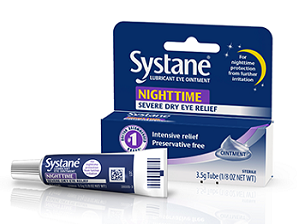
Price: < $10
Release form: Ointment
Description: This product is PF. It should be applied before you going to bed. Mineral oil and white petrolatum are used to moisturize your eyes so that your eyes are ready for the next day. You should get used to applying it; users should squeeze the tube carefully as you only need a tiny bit of the ointment.
Best for dry eye caused by screen time
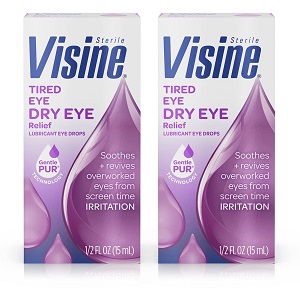 Visine Dry Eye Relief Tired Eye Drops
Visine Dry Eye Relief Tired Eye Drops
Price: > $10
Release form: Eye drops
Description: The formula of Visine’s Tired Eye is to put the drops into the eyes. The syndrome is caused by too much time looking at a laptop or mobile device. As stated by reviews this is one of the most frequently prescribed by eye doctors. It works quickly to relieve itchiness, redness, and inflammation.
Best for older eyes
TheraTears Dry Eye Therapy Eye Drops
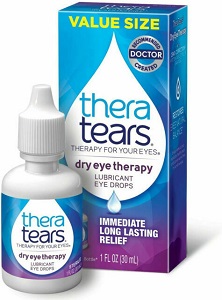
Price:> $10
Release form: Eye drops
Description: These drops are used to relieve dryness in addition to occasional blurred vision and tearing. These eye drops are PF. The package says that this product contains 5 of the electrolytes found in natural tears. The drops have helped with the itching and burning dry eye symptoms.
Best for use after LASIK
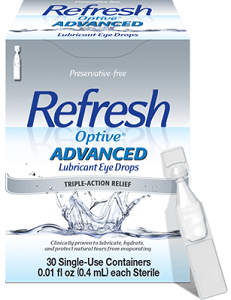 Refresh Optive Preservative-Free
Refresh Optive Preservative-Free
Price: below $10
Release form: Eye drops
Description: These eye drops could help cope with the itching, irritation, and dryness that may occur after laser eye surgery, like LASIK. Active ingredients include two types of lubricants. The formula is preservative-free. Patients mention that this product’s unique single-use packaging is efficient when traveling. Many reviewers also note that this product worked well for them after cataract or LASIK surgery.
How to overcome dry eye syndrome at home?
Living daily with dry eyes can cause great inconvenience and to prevent it, there are a number of measures that can help alleviate some of the symptoms of dry eye syndrome:
- The use of moisturizing OTC drops that can be purchased at a pharmacy. They are usually recommended to be instilled if necessary (although you should read the recommendations about the use for each type of drops before using them). However, if it is necessary to use drops more than once every two hours, it is preferable to use moisturizing drops without preservatives.
- The use of moisturizing ointments, which are thicker in consistency than drops. Using these gels can make vision a little difficult, so it is recommended to use them before going to bed.
- Avoid air movements, whether in a natural environment — wind, or devices such as fans or a hair dryer, as they can cause dry eyes. If it is not possible to avoid external factors (wind), it is necessary to wear sunglasses to protect your eyes.
- Use of humidifiers. Air conditioners and heating make the indoor air drier, so the use of humidifiers is recommended, which can increase the humidity of the environment and relieve some symptoms.
- To rest your eyes. If you read or watch TV, the symptoms of dry eyes worsen. Therefore, it is recommended to take short breaks to rest the eyes and blink more often to restore lost moisture.
- Avoid tobacco smoke. There are countless reasons to stay away from tobacco smoke, and one of them is that it can cause irritation and dryness of the eyes; and in fact, this is one of the factors that increase the risk for the appearance of this symptom.
- The use of warm compresses on the eyes and delicate cleansing of the eyelid skin with a special soap can help wash away the fat that accumulates on the eyelid glands, which will help improve the quality of tear fluid. After applying the soap, it is important to thoroughly wash it off with running water.
- Include omega-3 fatty acid supplements in your diet. In most cases, this can reduce the symptoms of dry eyes. This component can be obtained naturally from oily fish (salmon, sardines, anchovies) and flax seeds. Consult your eye doctor to find out if it would be appropriate for you to take omega-3 supplements and in what form and the appropriate dose.
When should I see a doctor?
- Acue eye pain. It doesn’t matter in what situation you felt it. It is possible that an acute pain occurred without an external cause in the middle of the working day, against the background of great visual tension. Maybe it’s related to an eye injury. There are many probabilities, but you should not guess what exactly caused the unpleasant sensation. In case of severe acute eye pain, contact an ophthalmologist as soon as possible, especially if such episodes of pain are repeated.
- Redness of the eyes. Whether you should worry depends on what kind of visual loads you have and whether you wear contact lenses. If you spend a lot of time in front of the computer, working with images and texts, redness of the eyes at the end of the working day should hardly surprise you. This may be a symptom of dry eye syndrome, which you should consult a doctor with as soon as possible.
- If you have been wearing contact lenses for a long time, then you are also probably familiar with this problem: when wearing lenses, your eyes may turn red, even when you do not feel any discomfort — no pain in your eyes, or the feeling that the lens interferes. If this is the case, if the eye does not turn red suddenly and strongly, then discuss the problem of eye redness with an ophthalmologist at the next visit.
- It became hard to see with glasses or lenses. This usually means that the visual indicators have changed. Make an appointment with an ophthalmologist and undergo a vision check in the near future. Incorrect correction with glasses or lenses is not only discomfort. With prolonged inadequate correction, vision may deteriorate, fatigue quickly sets in, headaches are possible, the development of dry eye syndrome.
- The eyes itch, hurt at any touch or attempt to rub. The eyes may itch and hurt with dry eye syndrome, but if pus is released, a tear flows profusely, the sensation of a foreign body under the eyelid is so strong that it is difficult to open the eyes, this may be a sign of an infectious eye disease or allergy. Do not hesitate to visit a doctor. If this is an allergic reaction, the doctor will prescribe appropriate treatment. In case of infection, you may even have to use antibiotics. And in such cases, as with viral conjunctivitis, the doctor will recommend certain hygiene measures to avoid infection of other family members living in the same apartment with you.
- There is a dryness of the eyes, there is a feeling as if something got into the eye, the eyes get tired quickly. As a rule, such complaints occur with dry eye syndrome. This is a very common problem, and not only because of the high loads on vision and the widespread use of gadgets. Dry eye syndrome can be the result of hormonal changes in the body, taking hormonal medications, prolonged use of eye drops with preservatives, develops in some autoimmune diseases, accompanies those who wear contact lenses. Since the symptoms may be similar to signs of other eye diseases, only a doctor can make a diagnosis, he also prescribes treatment.
- My eyes are double, the image has become blurry. This deterioration of vision is possible for several reasons. In young people, the image may temporarily become blurred or indistinct with visual loads, which in combination with other factors cause computer vision syndrome. It is characterized not only by temporary deterioration of vision, double vision, but also headaches, neck or back pain, and a rapid feeling of fatigue. In the eyes, it can also double with astigmatism. If vision has become blurry and does not improve, this may indicate the development of myopia or other eye problems.
- You can clearly see only part of what you are looking at, the edges or center of the image is blurred. Such problems may result from trauma to the eye, head, face, indicate the development of age-related macular degeneration or other dangerous age-related eye diseases. In this case, a doctor’s consultation is necessary as soon as possible in order to get rid of the consequences of injury or slow down the development of a dangerous disease due to the prescribed treatment.
- Sometimes “flies” or “dots” flies before your eyes. This is a very common phenomenon, fortunately, mostly safe for vision and eye health. Such “interference” is usually a shadow that, at a certain eye position, is cast by cells or minerals accumulated in the vitreous body. However, if it seems to you that the “flies” are too “persistent”, there are a lot of such “flies”, they interfere with looking, irritate — contact an ophthalmologist to find out the cause and find a way to handle the problem.
- Eye injury. A lot depends on what exactly happened. If sand gets into your eye while playing volleyball on the beach, you will most likely do without a doctor. But if, when working with wood, you did not protect your eyes with special glasses, and chips got into the eye, you should definitely go to the doctor as soon as possible. It is also necessary to consult a doctor after a blow to an eye, even if there is no visible damage. It will not hurt to consult an ophthalmologist for any head or face injury — with a blow, for example, retinal detachment is possible, which will subsequently make itself felt by a spot in front of the eye and loss of vision. The sooner you discover the problem, the more likely it is to completely preserve your eyesight.
How to prevent dry eye syndrome?
As a prevention of dry eyes, doctors recommend following a few simple rules:
- refuse drugs with potentially toxic effects (drops with preservatives);
- blink more often while watching TV, reading, working at the computer;
- position the monitor below eye level;
- monitor the humidity level in the room;
- keep the drinking regime;
- visit an ophthalmologist if there is discomfort in the eyes;
- timely treat pathologies that may affect the condition of the eyes;
- use special glasses that protect the organs of vision from exposure to ultraviolet radiation, monitor radiation;
- do visual gymnastics after prolonged eye strain;
- keep the rest and work regime;
- add foods rich in vitamins A, D, E, omega-3 fatty acids to the diet;
- wear properly selected lenses and do not violate the permissible terms of their operation.
Frequently asked questions
Can I treat dry eyes permanently?
Dry eye is a chronic disorder. You can’t overcome it completely. OTC eye drops, ointments, lifestyle changes, and RX products can all be a part of handling dry eye symptoms.
Does dry eye go away?
Dry eye does not fully go away. However, you may notice that seasonal allergies or certain activities make your dry eye symptoms disappear for a certain period of time. Avoiding the things that seem to irritate your eyes could mean you experience fewer symptoms.
Does lack of sleep cause dry eyes?
Lack of sleep can impact how hydrated your eyes are. That’s why your eyes can become dry and bloodshot when you are exhausted. Some eyelids don’t fully seal in moisture during the night, which can also result in dry eye.
Can dry eyes result in blindness?
In very rare, severe cases, dry eye can result in other states that eventually can cause blindness. Corneal ulcers can scar your eyeball if you don’t get treatment.
Category: Pharmacy Review
Tags: eye care, eye drops, eyes health